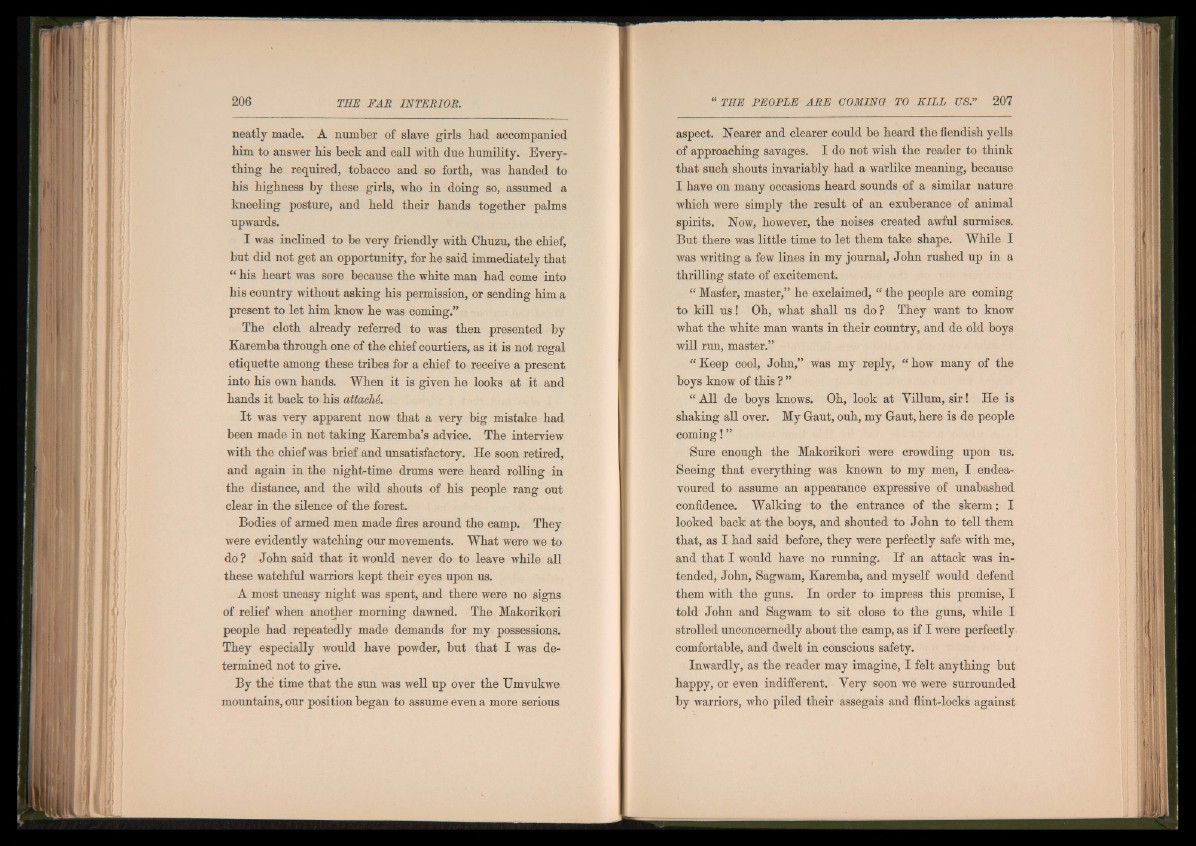
neatly made. A number of slave girls had accompanied
him to answer his beck and call with due humility. Everything
he required, tobacco and so forth, was handed to
his highness by these girls, who in doing so, assumed a
kneeling posture, and held their hands together palms
upwards.
I was inclined to be very friendly with Chuzu, the chief,
but did not get an opportunity, for he said immediately that
“ his heart was sore because the white man had come into
his country without asking his permission, or sending him a
present to let him know he was coming.”
The cloth already referred to was then presented by
Karemba through one of the chief courtiers, as it is not regal
etiquette among these tribes for a chief to receive a present
into his own hands. When it is given he looks at it and
hands it back to his attaché.
I t was very apparent now that a very big mistake had
been made in not taking Karemba’s advice. The interview
with the chief was brief and unsatisfactory. He soon retired,
and again in the night-time drums were heard rolling in
the distance, and the wild shouts of his people rang out
clear in the silence of the forest.
Bodies of armed men made fires around the camp. They
were evidently watching our movements. What were we to
do? John said that it would never do to leave while all
these watchful warriors kept their eyes upon us.
A most uneasy night was spent, and there were no signs
of relief when another morning dawned. The Makorikori
people had repeatedly made demands for my possessions.
They especially would have powder, but that I was determined
not to give.
By the time that the sun was well up over the Umvukwe
mountains, our position began to assume even a more serious
aspect. Nearer and clearer could be heard the fiendish yells
of approaching savages. I do not wish the reader to think
that such shouts invariably had a warlike meaning, because
I have on many occasions heard sounds of a similar nature
which were simply the result of an exuberance of animal
spirits. Now, however, the noises created awful surmises.
But there was little time to let them take shape. While I
was writing a few lines in my journal, John rushed up in a
thrilling state of excitement.
“ Master, master,” he exclaimed, “ the people are coming
to kill u s ! Oh, what shall us do ? They want to know
what the white man wants in their country, and de old boys
will run, master.”
“ Keep cool, John,” was my reply, “ how many of the
boys know of this ? ”
“ All de boys knows. Oh, look at Yillum, s ir! He is
shaking all over. My Gaut, ouh, my Gaut, here is de people
coming! ”
Sure enough the Makorikori were crowding upon us.
Seeing that everything was known to my men, I endeavoured
to assume an appearance expressive of unabashed
confidence. Walking to the entrance of the skerm; I
looked back at the boys, and shouted to John to tell them
that, as I had said before, they were perfectly safe with me,
and that I would have no running. If an attack was intended,
John, Sag warn, Karemba, and myself would defend
them with the guns. In order to impress this promise, I
told John and Sagwam to sit close to the guns, while I
strolled unconcernedly about the camp, as if I were perfectly
comfortable, and dwelt in conscious safety.
Inwardly, as the reader may imagine, I felt anything but
happy, or even indifferent. Very soon we were surrounded
by warriors, who piled their assegais and flint-locks against